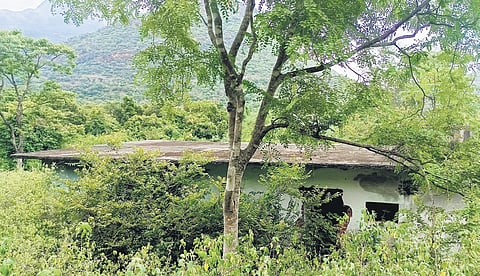

IDUKKI: Uttarakhand’s famed Jim Corbett National Park and hunter-turned-naturalist Jim Corbett who lived there are known to many. But, a woman hunter and the remnants of a community she helped set up in a wildlife sanctuary in Kerala way back in the 1960s remain pretty much little known.
Churulipetti village inside the Chinnar Wildlife Sanctuary in Idukki is the location where Kerala’s first woman hunter - Sikkari Kuttiyamma - set up a settlement and lived for nearly three decades. Although around 42 families that stayed in Churulipetti were evicted by the government in 1993, the courageous stories of Kuttiyamma alias Thresya Thomas, who protected the settlers from wild animals, and the remnants of her sophisticated farming practices would surprise any visitors to the sanctuary.
“Kuttiyamma, who belonged to the Vattavayalil family in Pala, was a woman who once dreamed of becoming a nun. However, circumstances forced her to become a hunter and settle in Churulipetti with her father and brothers in the 1960s,” Chinnar Wildlife Sanctuary social worker Mini Kashi told the TNIE.
A turning point in her life occurred when Kuttiyamma’s elder brother Pappachan was attacked by a bison inside the forest leaving him gravely injured. Since the family was too poor to pay his hospital bills, the hospital authorities demanded game meat instead of money from Pappachan’s family. That made Kuttiyamma take the gun for the first time and she shot down a bison weighing around 800 kg inside the Chinnar reserve forest.
In her journey for survival in the forest, she hunted several wild animals. Gradually, as the wild animals began to avoid Churulipetti fearing her gun, a small settlement of 42 families from Chinnar and nearby Tamil Nadu came up there.
Babu, a local jeep driver who earlier stayed with his mother Kunjamma in Churulipetti, said the perennial water resources in the forest and the assurance that wild animals won’t damage crops attracted local people to Churulipetti for farming.
It would be surprising to know that Kuttiyamma had set up a concrete canal irrigation facility in the village at that time to supply water for paddy, which was the major crop cultivated by residents then. The remnants of her abandoned concrete house, the canals and a church can still be seen inside the sanctuary.
Babu said his family then owned 7 acres in Churulipetti where paddy and lemongrass were grown. “The bountiful harvest promised us good income from farming and many outsiders longed to settle in Churulipetti then,” he said.
It is said that middlemen feared bargaining with Kuttiyamma to procure farm produce at a cheaper price. Hence, the harvest of the residents always fetched a good price from traders.
Kuttiyamma and the villagers were evicted by the government from the sanctuary in 1993 after offering them monetary compensation. Though she moved to Anakkal in Kanjirapally with her husband, she used to visit Churulipetti, the village she had helped set up, and offered service to its residents, often. After suffering from age-related illnesses, the woman hunter breathed her last in 2019.